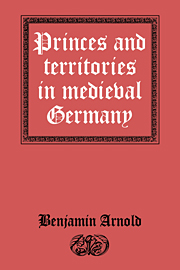Book contents
- Frontmatter
- Contents
- Acknowledgements
- List of abbreviations
- Introduction
- PART I CROWN AND PRINCE
- 1 German regal institutions and the princely order in the twelfth and thirteenth centuries
- 2 The crown, its rights, and the princes
- 3 Was there a ‘rise of territorial lordship’?
- PART II PRINCELY TITLE AND OFFICE
- PART III DYNASTIES, PRELATES, AND TERRITORIAL DOMINION
- Conclusion
- Index
3 - Was there a ‘rise of territorial lordship’?
Published online by Cambridge University Press: 03 December 2009
- Frontmatter
- Contents
- Acknowledgements
- List of abbreviations
- Introduction
- PART I CROWN AND PRINCE
- 1 German regal institutions and the princely order in the twelfth and thirteenth centuries
- 2 The crown, its rights, and the princes
- 3 Was there a ‘rise of territorial lordship’?
- PART II PRINCELY TITLE AND OFFICE
- PART III DYNASTIES, PRELATES, AND TERRITORIAL DOMINION
- Conclusion
- Index
Summary
The phrase ‘territorial lordship’ at the end of the last chapter refers us to the formidable tradition in German historiography which has examined the resources and method by which the princes renewed their authority in the regions, in some cases well before 1100. Collectively overreaching the powers of the crown in real political terms, the princes were able to establish virtually independent territorial states whose sovereignty, the ius territorii et superioritatis, was eventually sanctioned by the Treaty of Westphalia in 1648. Not only does the historiography of ‘territorial lordship’ consider the evolution of German regional history in the long term, but it has also to examine why the crown did not prevail as the stronger political force in Germany as it did in the other western kingdoms of medieval Europe, as well as providing concrete institutional evidence for the rise of autonomous princely authority region by region.
It must be admitted that such aims have only partially been achieved. It appears that the crucial era for the emergence of a more pointedly autarkic and regionally based princely authority stretched from the late eleventh to the early fourteenth centuries, and was made possible by several interactive social forces. One of them was the break-up of widely defined aristocratic kindreds into narrower patrilinear dynasties with a much greater sense of localized power and identity, symbolized by the introduction of toponymies or family place names derived from newly-constructed stone castles which were the effective new centres of aristocratic lands and rights.
- Type
- Chapter
- Information
- Princes and Territories in Medieval Germany , pp. 61 - 74Publisher: Cambridge University PressPrint publication year: 1991



